- Home
- John Boyne
The Boy in the Striped Pajamas
The Boy in the Striped Pajamas Read online
‘A small wonder of a book’
Guardian
‘Packed with overtones that remain in the imagination’
Independent
‘A powerful story, simply told’
Irish Examiner
‘Quite impossible to put down, this is the rare kind of book that doesn’t leave your head for days…Unique and captivating’
The Bookseller
‘A book so simple, so seemingly effortless, that it’s almost perfect…Raw literary talent at its best’
Irish Independent
‘Simply written and highly memorable. There are no monstrosities on the page but the true horror is all the more potent for being implicit’
Ireland on Sunday
‘A powerful and emotionally-charged piece of literature’
Yorkshire Evening Post
‘An extraordinary book’
TES
‘It is a novel that inspires thought and difference of opinion, it is a book that deserves to be read, to be discussed, to be held close to the heart’
Achuka
‘Overwhelmingly powerful’
Carousel
Also by John Boyne
Novels:
The Thief of Time
The Congress of Rough Riders
Crippen
Next of Kin
Mutiny on the Bounty
The House of Special Purpose
The Absolutist
This House is Haunted
A History of Loneliness
Novels for Younger Readers:
Noah Barleywater Runs Away
The Terrible Thing That Happened to Barnaby Brocket
Stay Where You Are and Then Leave
The Boy at the Top of the Mountain
Short Stories:
Beneath the Earth & Other Stories
THIS IS A BORZOI BOOK PUBLISHED BY ALFRED A. KNOPF
This is a work of fiction. All incidents and dialogue, and all characters with the exception of some well-known historical and public figures, are products of the author’s imagination and are not to be construed as real. Where real-life historical or public figures appear, the situations, incidents, and dialogues concerning those persons are fictional and are not intended to depict actual events or to change the fictional nature of the work. In all other respects, any resemblance to persons living or dead is entirely coincidental.
Text copyright © 2006 by John Boyne
Introduction copyright © 2016 by John Boyne
Cover art and interior illustrations copyright © 2016 by Oliver Jeffers
All rights reserved. Published in the United States by Alfred A. Knopf, an imprint of Random House Children’s Books, a division of Penguin Random House LLC, New York. Originally published in Great Britain by David Fickling Books, an imprint of Random House Children’s Books, New York, in 2006. Knopf, Borzoi Books, and the colophon are registered trademarks of Penguin Random House LLC.
Visit us on the Web! randomhouseteens.com
Educators and librarians, for a variety of teaching tools, visit us at
RHTeachersLibrarians.com
Library of Congress Cataloging-in-Publication Data
tk
Ebook ISBN 9781524766535
Random House Children’s Books supports the First Amendment and celebrates the right to read.
v4.1
a
For Jamie Lynch
Acknowledgments
For all their advice and insightful comments and for never allowing me to lose my focus on the story, many thanks to David Fickling, Bella Pearson, and Linda Sargent. And for getting behind this from the start, thanks, as ever, to my agent, Simon Trewin. Thanks also to my old friend Janette Jenkins for her great encouragement after reading an early draft.
Contents
Cover
Also by John Boyne
Title Page
Copyright
Dedication
Acknowledgments
Introduction
1. Bruno Makes a Discovery
2. The New House
3. The Hopeless Case
4. What They Saw Through the Window
5. Out of Bounds At All Times and No Exceptions
6. The Overpaid Maid
7. How Mother Took Credit For Something That She Hadn’t Done
8. Why Grandmother Stormed Out
9. Bruno Remembers That He Used to Enjoy Explorations
10. The Dot That Became a Speck That Became a Blob That Became a Figure That Became a Boy
11. The Fury
12. Shmuel Thinks of an Answer to Bruno’s Question
13. The Bottle of Wine
14. Bruno Tells a Perfectly Reasonable Lie
15. Something He Shouldn’t Have Done
16. The Haircut
17. Mother Gets Her Own Way
18. Thinking Up the Final Adventure
19. What Happened the Next Day
20. The Last Chapter
About the Author
About the Illustrator
Introduction to the 10th-Anniversary Edition
When I was writing my novel The Boy in the Striped Pajamas during 2004 and 2005, I never expected that it would go on to have such a long and varied life. I started with a very simple image of two boys sitting on either side of a fence, talking to each other, and was immediately interested in the journey that would bring them there, the conversations they would have and the necessary end that I felt their story would reach.
Ten years later, the novel not only changed my life but introduced me to people who I had never expected to encounter. In my travels, I’ve been fortunate to meet survivors of the many death camps that were built around Europe during the early 1940s and hear their stories first hand, as well as descendants of the murdered, who have been generous enough to share their memories and grief with me. It’s been a privilege to be present for such moments and to take part in such emotive conversations.
There are two things that interest me above all others in young people’s literature and I’ve returned to them several times in subsequent books: the manner in which war affects and destroys the experience of childhood, which is supposed to be a happy and carefree period, and what it means for a child to be thrust into an adult situation far ahead of time. The heroes of my novels are, like Bruno, always optimistic, resourceful and a little naïve, and they don’t want an adult to solve their problems for them, even when they’re not always capable of solving them themselves. They’re growing up surrounded by confusion and trying to make sense of it all. Sometimes they succeed and sometimes the chaos overwhelms them. But they’re never defeated.
It’s been a pleasure to work with my friend Oliver Jeffers on this tenth anniversary edition. Oliver and I have collaborated on a number of books together, but his jacket design and illustrations for The Boy in the Striped Pajamas show an artist at the height of his creative and imaginative powers, and, as ever, it’s my privilege to work with him.
I will always be grateful to those millions of readers who allowed The Boy in the Striped Pajamas into their lives, those who have been moved by the story and, indeed, those who have taken issue with aspects of it and been vocal in their antipathy. After all, the great joy of literature, as opposed to politics or religion, is that it embraces differing opinions, it encourages debate, it allows us to have heated conversations with our closest friends and dearest loved ones and through it all no one gets hurt, no one gets taken away from their homes and no one gets killed.
One afternoon, when Bruno came home from school, he was surprised to find Maria, the family’s maid – who always kept her head bowed and never looked up from the carpet – standing in his bedroom, pulling all
his belongings out of the wardrobe and packing them in four large wooden crates, even the things he’d hidden at the back that belonged to him and were nobody else’s business.
‘What are you doing?’ he asked in as polite a tone as he could muster, for although he wasn’t happy to come home and find someone going through his possessions, his mother had always told him that he was to treat Maria respectfully and not just imitate the way Father spoke to her. ‘You take your hands off my things.’
Maria shook her head and pointed towards the staircase behind him, where Bruno’s mother had just appeared. She was a tall woman with long red hair that she bundled into a sort of net behind her head, and she was twisting her hands together nervously as if there was something she didn’t want to have to say or something she didn’t want to have to believe.
‘Mother,’ said Bruno, marching towards her, ‘what’s going on? Why is Maria going through my things?’
‘She’s packing them,’ explained Mother.
‘Packing them?’ he asked, running quickly through the events of the previous few days to consider whether he’d been particularly naughty or had used those words out loud that he wasn’t allowed to use and was being sent away because of it. He couldn’t think of anything though. In fact over the last few days he had behaved in a perfectly decent manner to everyone and couldn’t remember causing any chaos at all. ‘Why?’ he asked then. ‘What have I done?’
Mother had walked into her own bedroom by then but Lars, the butler, was in there, packing her things too. She sighed and threw her hands in the air in frustration before marching back to the staircase, followed by Bruno, who wasn’t going to let the matter drop without an explanation.
‘Mother,’ he insisted. ‘What’s going on? Are we moving?’
‘Come downstairs with me,’ said Mother, leading the way towards the large dining room where the Fury had been to dinner the week before. ‘We’ll talk down there.’
Bruno ran downstairs and even passed her out on the staircase so that he was waiting in the dining room when she arrived. He looked at her without saying anything for a moment and thought to himself that she couldn’t have applied her make-up correctly that morning because the rims of her eyes were more red than usual, like his own after he’d been causing chaos and got into trouble and ended up crying.
‘Now, you don’t have to worry, Bruno,’ said Mother, sitting down in the chair where the beautiful blonde woman who had come to dinner with the Fury had sat and waved at him when Father closed the doors. ‘In fact if anything it’s going to be a great adventure.’
‘What is?’ he asked. ‘Am I being sent away?’
‘No, not just you,’ she said, looking as if she might smile for a moment but thinking better of it. ‘We all are. Your father and I, Gretel and you. All four of us.’
Bruno thought about this and frowned. He wasn’t particularly bothered if Gretel was being sent away because she was a Hopeless Case and caused nothing but trouble for him. But it seemed a little unfair that they all had to go with her.
‘But where?’ he asked. ‘Where are we going exactly? Why can’t we stay here?’
‘Your father’s job,’ explained Mother. ‘You know how important it is, don’t you?’
‘Yes, of course,’ said Bruno, nodding his head, because there were always so many visitors to the house – men in fantastic uniforms, women with typewriters that he had to keep his mucky hands off – and they were always very polite to Father and told each other that he was a man to watch and that the Fury had big things in mind for him.
‘Well, sometimes when someone is very important,’ continued Mother, ‘the man who employs him asks him to go somewhere else because there’s a very special job that needs doing there.’
‘What kind of job?’ asked Bruno, because if he was honest with himself – which he always tried to be – he wasn’t entirely sure what job Father did.
In school they had talked about their fathers one day and Karl had said that his father was a greengrocer, which Bruno knew to be true because he ran the greengrocer’s shop in the centre of town. And Daniel had said that his father was a teacher, which Bruno knew to be true because he taught the big boys who it was always wise to steer clear of. And Martin had said that his father was a chef, which Bruno knew to be true because he sometimes collected Martin from school and when he did he always wore a white smock and a tartan apron, as if he’d just stepped out of his kitchen.
But when they asked Bruno what his father did he opened his mouth to tell them, then realized that he didn’t know himself. All he could say was that his father was a man to watch and that the Fury had big things in mind for him. Oh, and that he had a fantastic uniform too.
‘It’s a very important job,’ said Mother, hesitating for a moment. ‘A job that needs a very special man to do it. You can understand that, can’t you?’
‘And we all have to go too?’ asked Bruno.
‘Of course we do,’ said Mother. ‘You wouldn’t want Father to go to his new job on his own and be lonely there, would you?’
‘I suppose not,’ said Bruno.
‘Father would miss us all terribly if we weren’t with him,’ she added.
‘Who would he miss the most?’ asked Bruno. ‘Me or Gretel?’
‘He would miss you both equally,’ said Mother, for she was a great believer in not playing favourites, which Bruno respected, especially since he knew that he was her favourite really.
‘But what about our house?’ asked Bruno. ‘Who’s going to take care of it while we’re gone?’
Mother sighed and looked around the room as if she might never see it again. It was a very beautiful house and had five floors in total, if you included the basement, where Cook made all the food and Maria and Lars sat at the table arguing with each other and calling each other names that you weren’t supposed to use. And if you added in the little room at the top of the house with the slanted windows where Bruno could see right across Berlin if he stood up on his tiptoes and held onto the frame tightly.
‘We have to close up the house for now,’ said Mother. ‘But we’ll come back to it someday.’
‘And what about Cook?’ asked Bruno. ‘And Lars? And Maria? Are they not going to live in it?’
‘They’re coming with us,’ explained Mother. ‘But that’s enough questions for now. Maybe you should go upstairs and help Maria with your packing.’
Bruno stood up from the seat but didn’t go anywhere. There were just a few more questions he needed to put to her before he could allow the matter to be settled.
‘And how far away is it?’ he asked. ‘The new job, I mean. Is it further than a mile away?’
‘Oh my,’ said Mother with a laugh, although it was a strange kind of laugh because she didn’t look happy and turned away from Bruno as if she didn’t want him to see her face. ‘Yes, Bruno,’ she said. ‘It’s more than a mile away. Quite a lot more than that, in fact.’
Bruno’s eyes opened wide and his mouth made the shape of an O. He felt his arms stretching out at his sides like they did whenever something surprised him. ‘You don’t mean we’re leaving Berlin?’ he asked, gasping for air as he got the words out.
‘I’m afraid so,’ said Mother, nodding her head sadly. ‘Your father’s job is—’
‘But what about school?’ said Bruno, interrupting her, a thing he knew he was not supposed to do but which he felt he would be forgiven for on this occasion. ‘And what about Karl and Daniel and Martin? How will they know where I am when we want to do things together?’
‘You’ll have to say goodbye to your friends for the time being,’ said Mother. ‘Although I’m sure you’ll see them again in time. And don’t interrupt your mother when she’s talking, please,’ she added, for although this was strange and unpleasant news, there was certainly no need for Bruno to break the rules of politeness which he had been taught.
‘Say goodbye to them?’ he asked, staring at her in surprise. ‘Say goodbye to them?’ he repeated
, spluttering out the words as if his mouth was full of biscuits that he’d munched into tiny pieces but not actually swallowed yet. ‘Say goodbye to Karl and Daniel and Martin?’ he continued, his voice coming dangerously close to shouting, which was not allowed indoors. ‘But they’re my three best friends for life!’
‘Oh, you’ll make other friends,’ said Mother, waving her hand in the air dismissively, as if the making of a boy’s three best friends for life was an easy thing.
‘But we had plans,’ he protested.
‘Plans?’ asked Mother, raising an eyebrow. ‘What sort of plans?’
‘Well, that would be telling,’ said Bruno, who could not reveal the exact nature of the plans – which included causing a lot of chaos, especially in a few weeks’ time when school finished for the summer holidays and they didn’t have to spend all their time just making plans but could actually put them into effect instead.
‘I’m sorry, Bruno,’ said Mother, ‘but your plans are just going to have to wait. We don’t have a choice in this.’
‘But, Mother!’
‘Bruno, that’s enough,’ she said, snapping at him now and standing up to show him that she was serious when she said that was enough. ‘Honestly, only last week you were complaining about how much things have changed here recently.’
‘Well, I don’t like the way we have to turn all the lights off at night now,’ he admitted.
‘Everyone has to do that,’ said Mother. ‘It keeps us safe. And who knows, maybe we’ll be in less danger if we move away. Now, I need you to go upstairs and help Maria with your packing. We don’t have as much time to prepare as I would have liked, thanks to some people.’

 Beneath the Earth
Beneath the Earth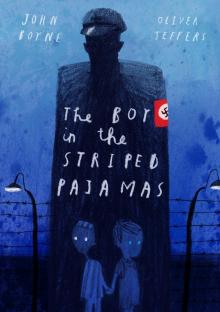 The Boy in the Striped Pajamas
The Boy in the Striped Pajamas Next of Kin
Next of Kin The House of Special Purpose
The House of Special Purpose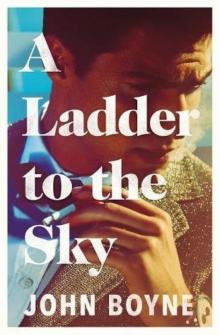 A Ladder to the Sky
A Ladder to the Sky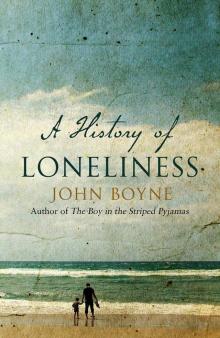 A History of Loneliness
A History of Loneliness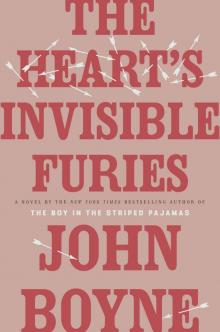 The Heart's Invisible Furies
The Heart's Invisible Furies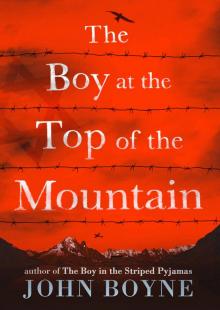 The Boy at the Top of the Mountain
The Boy at the Top of the Mountain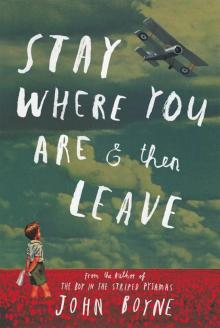 Stay Where You Are and Then Leave
Stay Where You Are and Then Leave Crippen: A Novel of Murder
Crippen: A Novel of Murder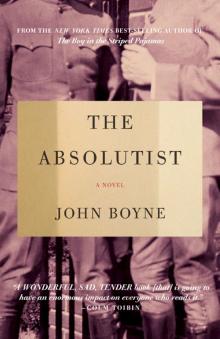 The Absolutist
The Absolutist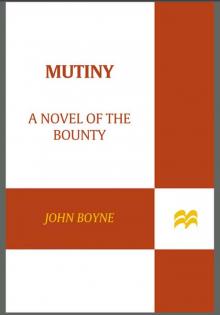 Mutiny: A Novel of the Bounty
Mutiny: A Novel of the Bounty A Traveler at the Gates of Wisdom
A Traveler at the Gates of Wisdom The Congress of Rough Riders
The Congress of Rough Riders The Thief of Time
The Thief of Time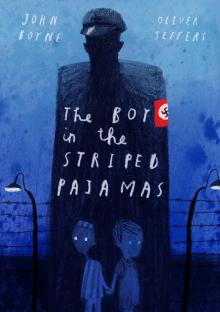 The Boy in the Striped Pajamas (Deluxe Illustrated Edition)
The Boy in the Striped Pajamas (Deluxe Illustrated Edition)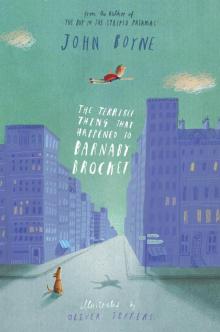 The Terrible Thing That Happened to Barnaby Brocket
The Terrible Thing That Happened to Barnaby Brocket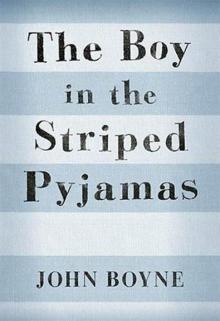 The Boy In The Striped Pyjamas
The Boy In The Striped Pyjamas Crippen
Crippen